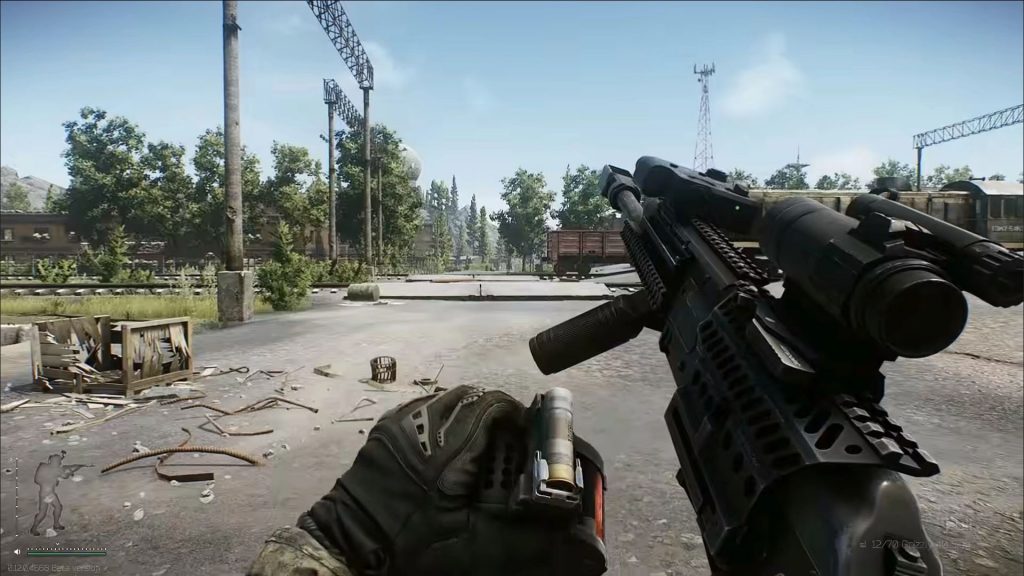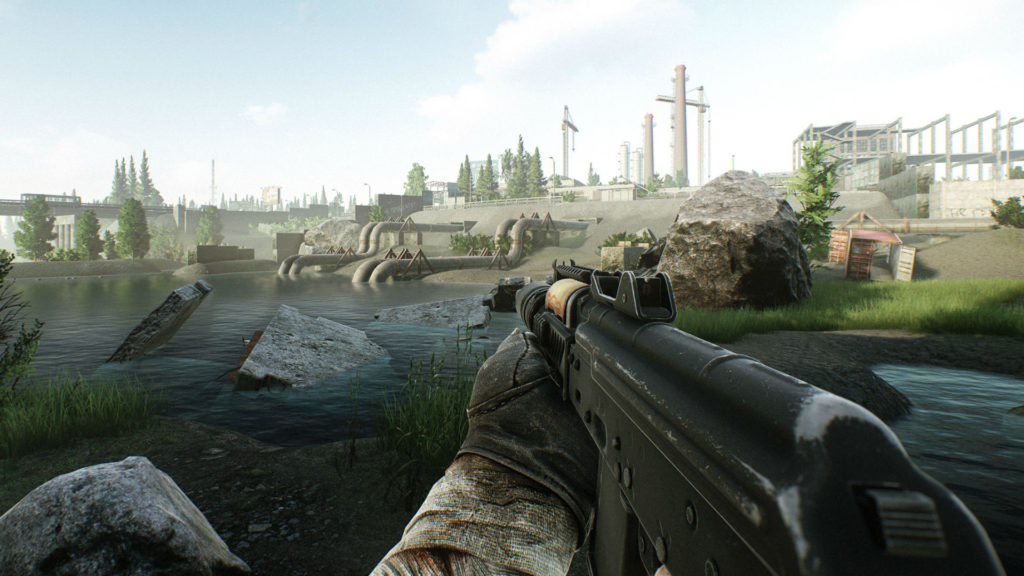You load in, nervous but ready; backpack empty and senses heightened. You step into the fray with rifles cocked and loaded. Yet, in Escape from Tarkov, you’re heard before you’re seen – every footstep, rustle, and magazine click can give you away. Now taking fire from the shadows, Tarkov shows you it doesn’t care about being friendly, only about feeling real.
Battlestate Games’ extraction shooter started them all, but here’s the thing: it’s 2025, and extraction shooters are everywhere. ARC Raiders hooks players with spectacle, while Arena Breakout: Infinite softens Tarkov’s punishing edge. Marathon dominates conversation despite Bungie’s stumbling reputation. In beta since 2017, is Escape from Tarkov’s full release coming too late? Or does everyone else’s arrival signal it was right all along?
Quick overview: Escape from Tarkov 1.0 releases November 15th. For veterans, the final version isn’t just another update but the finish line to an eight-year marathon. For rookies, it’s an invitation to step onto a battlefield that’s been mythologised, criticised, and feared in equal measure. Few games come with this level of scrutiny, and fewer still seem proud of it.
Throughout Tarkov’s beta, server “wipes” reset everyone’s progress. They’re part ritual, part frustration, keeping veterans hooked and newcomers hesitant. But, it’s more than progression that is lost – rhythm, history, sometimes an entire player base, begins anew. You get why Battlestate does it – resets are simpler than reinvention – but to some, wipes are punishment dressed as maintenance, while others see them as a sign of futility. If everything is eventually lost, then what’s the point of suffering? Rippling through attitudes in real-life is Tarkov’s uncompromising authenticity.
Now, with its final version imminent, Battlestate Games must prove Tarkov’s realism can outshine its rivals’ gloss. Yet, Tarkov’s problem, or maybe its strength, is that it feels less like a finished product than a lived-in system. Its mechanics are established, but where does that leave you, as a player, when sleek, unproven competition is preparing its first ambush?
Look – if you’ve been paying attention to extraction shooters this year you’ll know Tarkov isn’t alone. Mixing PvP or PvE gunfights with survival and loot gathering – the bones of extraction shooting – each rival promises what Tarkov already does but in flashier, shinier forms, with more streamlined progression or approachable designs. Likewise, shooters, in general, still dominate the landscape – look at CoD versus Battlefield locking horns again like it’s 2003.
So, questioning both Tarkov 1.0’s timing and its hostility seems apt, but there is a twist: no other extraction shooter matches its brutal, masochistic bloodshed. ARC Raiders can’t mimic the tension of Tarkov’s firefights, where one bullet costs you everything. Arena Breakout’s polish gives less feelings of reward than persevering through Tarkov’s friction. Yes, Escape From Tarkov’s realism is its gatekeeper, but that’s precisely why its “lateness” might actually work in its favour.
See, Tarkov is cruel. But if it’s cruel, its veterans are complicit, having spent countless hours not just learning its systems, its meta economy, its map layouts and loot spawns, but enduring them. Wiping clean a player’s reputation, removing their stash, and resetting their level doesn’t erase their effort. For other games, wipes would be suicide. In Tarkov, its gratification manifest.

Yet, the community is split: one half pleads for bug fixes and balance, while the other laments the die-hards bent on onboarding new players. Seasoned veterans, those who’ve eschewed spoon-feeding for hard study, rise above the parapet. They realise the honor of self-flagellation; their duty is not to inflict that pain on others but to encourage them to inflict it on themselves. If Tarkov’s pain is proof of its purity then its enjoyment is existential, those who mourn what’s lost after every wipe are missing the point. In other words: if you want to box-tick achievements ad infinitum, this game isn’t for you. Wiping the slate clean recycles tension, deepens atmosphere, raises suspense – they’re new opportunities to learn, be resilient, and to triumph. These are cravings which can’t be satisfied by endless new content.
But here’s the real question: how long can this devotion last? Cynically, longtime players might come to view server wipes as indication Battlestate has no concrete plans for post-final version support. That they’ll simply stop working on the game once it’s done. This isn’t true, as seasonal events and DLC are in the pipeline. But Battlestate spotted this conundrum already, introducing changes to how progress and standing gained in PvE stays in PvE, whilst the same earned in PvP and EFT: Arena transfers to other modes. A suite of enemy AI refinements have come to offline solo play too – the mode first introduced in 2024 – modifying detection and behaviour to enhance realism beyond PvP. The studio are laying groundwork to cater to Tarkov’s more casual playerbase following 1.0’s release without diluting the sense of achievement tied to the experience for serious players. The promise of 1.0’s stability and progression tweaks give it a sense of arrival and newfound approachability, but Battlestate has been clear: playing towards one of Tarkov 1.0’s four endings will be a difficult feat, and not everyone will see the best ending. In fact, performing well won’t guarantee escape at all.
But, circling back to one of Tarkov’s tenets, maybe escape isn’t crucial to the experience. The extraction genre has caught up, sure, but it’s chasing something Escape From Tarkov never promised: comfort. Battlestate’s shooter was never meant to be approachable, it never offered to hold your hand, its victories were never meant to be built on skill alone. Its purpose is to test patience, not reflexes; enjoyment through endurance. If there’s a point to suffering, it’s in the suffering itself.
Among a garrison of sleeker, faster shooters, you can see why Tarkov might seem conceptually outdated. But its realism is not a relic – every wipe, every death, every failed extraction, everything reaffirms what no other shooter dares to demand: effort with no guarantee of reward.

Loading into a run, nerves present, you’ll want to fill that backpack; to be weighed down by the loot you’ve scored. Because, only when your back is to the wall will you truly tune into the environment’s frequency. If you want the best chance of escaping with that loaded backpack – with footsteps heavy, breathing laboured, and stamina dwindling – you need to study the game’s systems and learn the risks. Is it worth loading in with your most powerful weapons?
How many healing items should you carry? How much distance are you likely to traverse? These questions, and more, offer crucial insight into how Tarkov veterans operate. These systems directly influence the psychology of warfare in ways unmatched by rivals – bringing your strongest armour, guns, and most piercing ammo rounds might increase your odds of survival, but you risk losing it all in the blink of an eye.
Tarkov’s cycle of loss and renewal builds a strange kind of intimacy. Every victory is unique and hard-fought, but they’re not as memorable – it’s in the raids that went wrong, the time you bled out metres from extraction, the sound of footsteps that weren’t yours. Spending hours in Escape From Tarkov’s world is like writing a catalogue of failures. But, that makes all the small triumphs even sweeter. Battlestate’s competition might look ready for war, but in Escape From Tarkov, you’re already surviving it.
Note: The views expressed in this article are those of the author and do not necessarily represent the views of, and should not be attributed to, GamingBolt as an organization.



This post highlights the intense and immersive experience of Escape From Tarkov. It’s interesting to see how player rewards can impact engagement and retention. Looking forward to seeing how the game evolves!